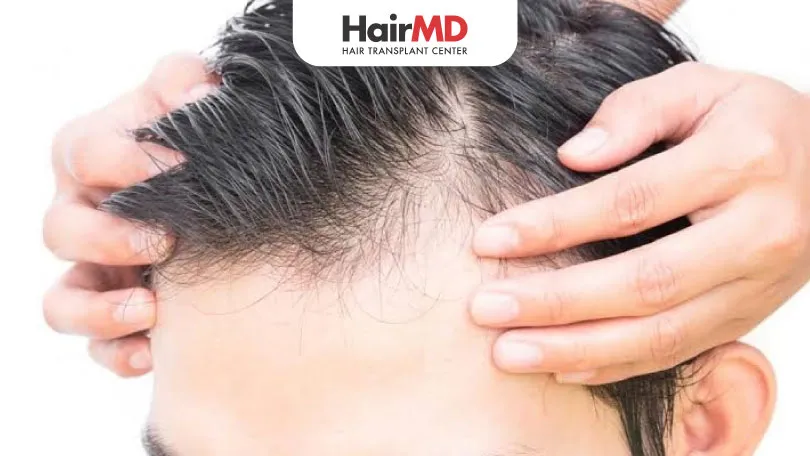Hair loss has become very common nowadays. Hair loss is clinically known as Alopecia. Hair loss is seen in all age groups, male, female, teenagers. There are many reasons and factors which causes hair loss. Let’s see what are the causes of hair loss in men. The reasons for hair loss in men can vary greatly.

Table Of Content
- Reasons For Hair Loss
- Conclusion
Reasons For Hair Loss
The following can be probable reasons, single or combined, behind your hair loss.
- Hereditary:
If anyone from your family, parents, grandparents or cousins, who are struggling with less hair or thinning of hair or balding. It is likely that you are carrying the V gene, responsible for depleting hair. This gene may get stimulated by changes in hormone levels as well. It is a very common cause of hair loss in men.
- Hormonal changes:
Hormonal changes can be a cause in both males and females, particularly the latter. Basically there are three phases in the life of a woman, where she goes through physiological changes and hormonal fluctuations. Making her highly susceptible to hair loss. At the time of puberty, when menarche sets in, post-pregnancy, when the hormone levels drop down after delivery of the baby and around the time of menopause. Sometimes, Hormonal fluctuations may also occur in pathological conditions, like fibroid, PCOS (polycystic ovaries syndrome). And non-gynecological conditions like diabetes and thyroid disorders.
- Telogen effluvium:
Telogen effluvium is a condition in which sudden hair fall occurs, in times of stress. The stress can be physical or mental. Physiologic stress could occur in patients suffering from long term illness like typhoid, the stress of surgery, those on heavy antibiotics for long, improper sleep for months, etc; while mental stress persisting for more than 3-4 months could lead to hormonal imbalance and thereby, hair loss.
Stress could also be seen due to nutritional insufficiency in teenagers who are on an ill-advised diet. The growth of hair is cyclic, which includes a growing phase and a falling phase. In Telogen effluvium growing hair which is triggered by stress, suddenly falls into the fall phase. This loss is a temporary, and new growth appears within a year, provided you deal with the stressful condition and take additional nutritional supplements.
- Nutritional deficiency:
Hairs are made up of a protein called keratin; hence a diet rich in protein would contribute to its healthy growth. Hair cells are the second fastest-growing cells in the body which also need a lot of energy. So a healthy diet is essential. Vitamins, minerals. nutrients are also required for the growth of thick, shiny hair.
A deficiency in B-complex vitamins, especially B5, B7, B12, vitamins C, D, zinc, iron, and minerals would compromise with hair thickness, it’s quality and shine. It is advised that you consult your doctor, get blood tests done for evaluation. And take additional nutritional supplements to correct any deficiency, if detected.
- Heavy Medications:
Patients fighting cancer may have another battle on their hands. Because the chemotherapy and radiation used in the management of cancer come with complications of severe hair loss. Also, patients who are on beta-blockers for hypertension, blood thinners, oral contraceptives, long-term antibiotics may experience hair loss. This is temporary, and once the drug has been discontinued, normal hair growth resumes.
- Skin diseases:
Skin diseases like psoriasis, ringworm infections, may also afflict the scalp skin. Which can lead to dry scaling skin and dense dandruff. Sometimes these conditions may turn serious if not treated early and can cause permanent hair loss.
- Alopecia Areata:
It’s an autoimmune condition, where you have an overactive immune system. This can attack hair follicles of your own body. Hair loss can occur in patches on the scalp, as well as on other places on the body. It’s usually reversible, and regrowth appears within a year. But if not treated timely, it could turn into a serious condition. It can recur in intervals, which can cause hair loss from all over the body. Additionally, it also leads to emotional disturbances and psychological stress, due to self-image issues.
- Anagen effluvium:
Anagen effluvium is a condition in which hair loss occurs in the growth phase itself. It is triggered usually by radiation and chemotherapy.
Conclusion
Popular Q&As
How to use dermaroller and minoxidil for hair loss?
How to use a dermaroller and minoxidil for hair loss? Dr Dhananjay Chavan dermatologist has given all information, follow the steps to get more idea about it.
Does PRP work for hair loss in men?
Let us try to know Does PRP for hair loss in men really work. I Dr. Dhananjay Chavan renowned dermatologist will try to give all the information about PRP.
Should You Use Minoxidil for Hair Loss?
Minoxidil is a leading treatment for hair loss. Find out if it’s the right option for your hair thinning and how it promotes regrowth.
We Got Your Back! Ask Us Anything On Your Mind!
Reach out to us on


